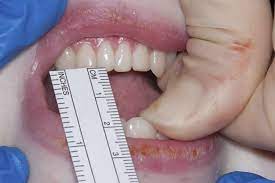
Trismus is a painful condition which is also called as reduced mouth opening.
For most people, fully opening the mouth means opening it beyond 35 mm wide a little greater than the width of two fingers.
These include feeding and swallowing problems, oral hygiene issues, and even difficulty speaking.
What are the symptoms?
- pain in jaw, even without movement
- difficulty or discomfort performing activities that involve opening the mouth wide
- inability to chew or swallow certain foods
- muscle pain
- sensation of muscle tightness and stiffness
- headache
- cramping in the jaw
How it’s diagnosed
- measure how wide you can open your mouth
- ask about any recent dental treatments or procedures
- ask about any possible injuries to your jaw for example, if you were hit in the jaw during a sporting or car accident
- ask about any history of prior surgery or radiation therapy to your head and neck
Treatment
Trismus is more commonly temporary than permanent.
Use of a jaw-stretching device. A physical therapist will tell you which stretches to perform and how often.
- Medication. Your doctor may recommend or prescribe a muscle relaxant, pain reliever, or anti-inflammatory medication.
- Dietary changes. Following a soft food diet and avoiding hard, crunchy foods is often recommended to ease pain until symptoms improve.
- Acupuncture.
Trismus exercise
- Stretch your neck by moving your head forward and backward and then turning left and right. Bend your head and press your ear to your shoulder, holding for 20-30 seconds before repeating on the other side. Repeat 5 times on each side.
Home remedies
- Massage. Find the areas of your jaw that are painful and, moving your fingers in a circular motion, massage the area for about 30 seconds.
- Avoid clenching your jaw shut or grinding your teeth together.
- Take a magnesium supplement
- Heat therapy. Placing a hot, moist towel on the jaw for 15 minutes each hour can relax the muscles and promote blood flow.
Visit us at bestorthodontistbracespune.in to know more
